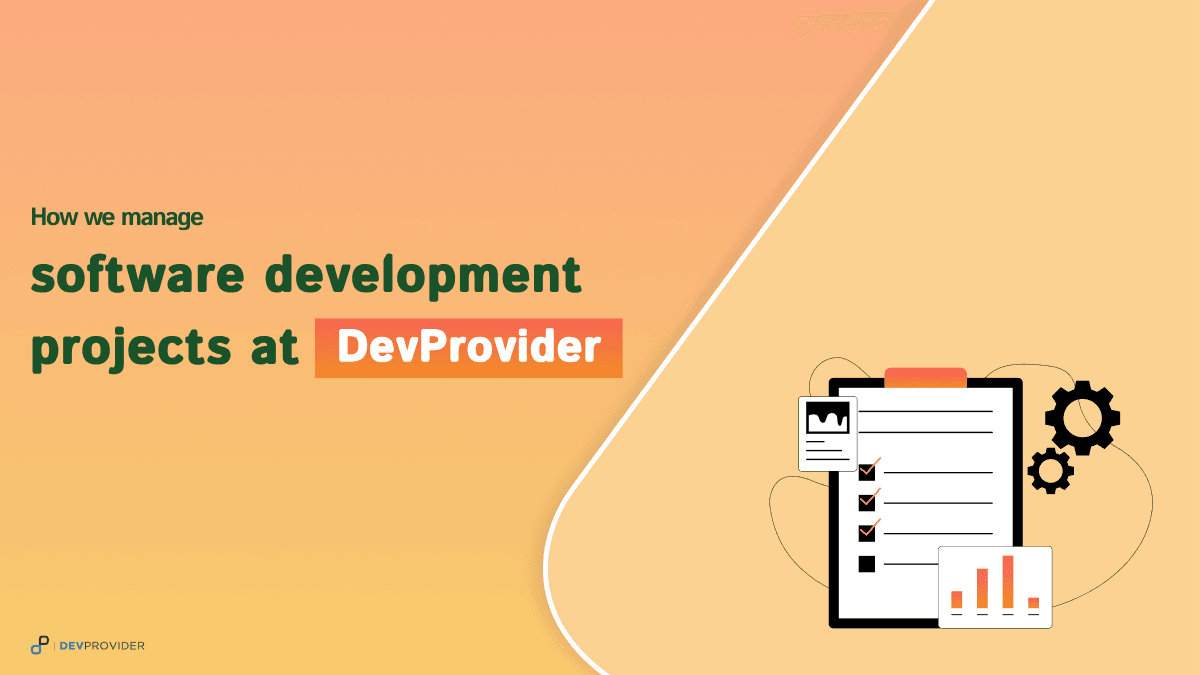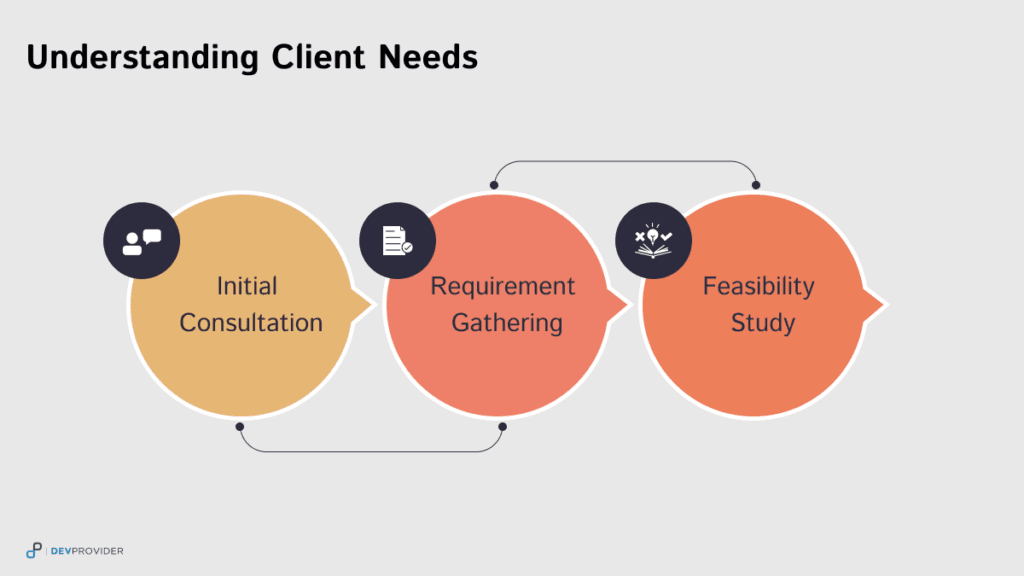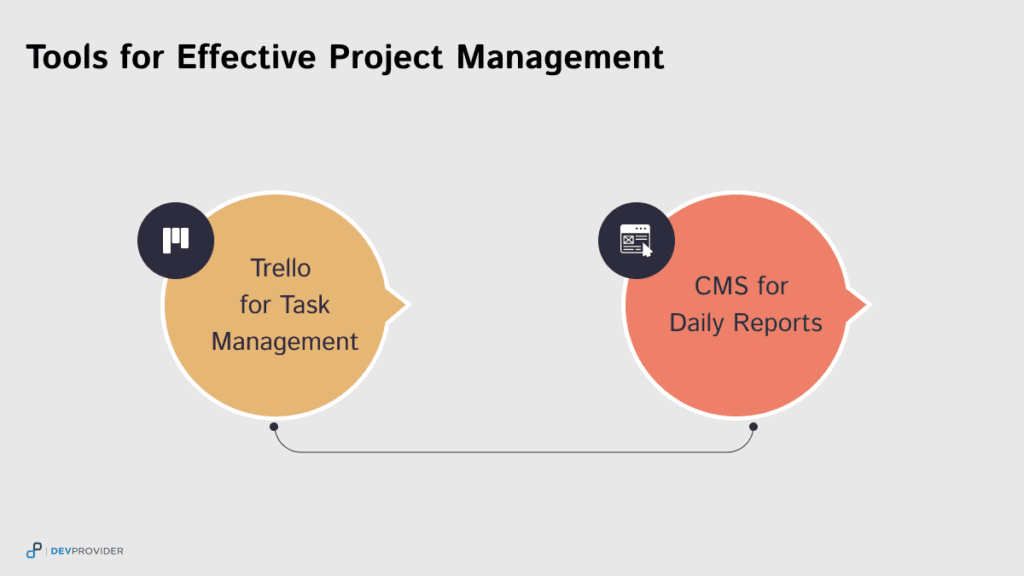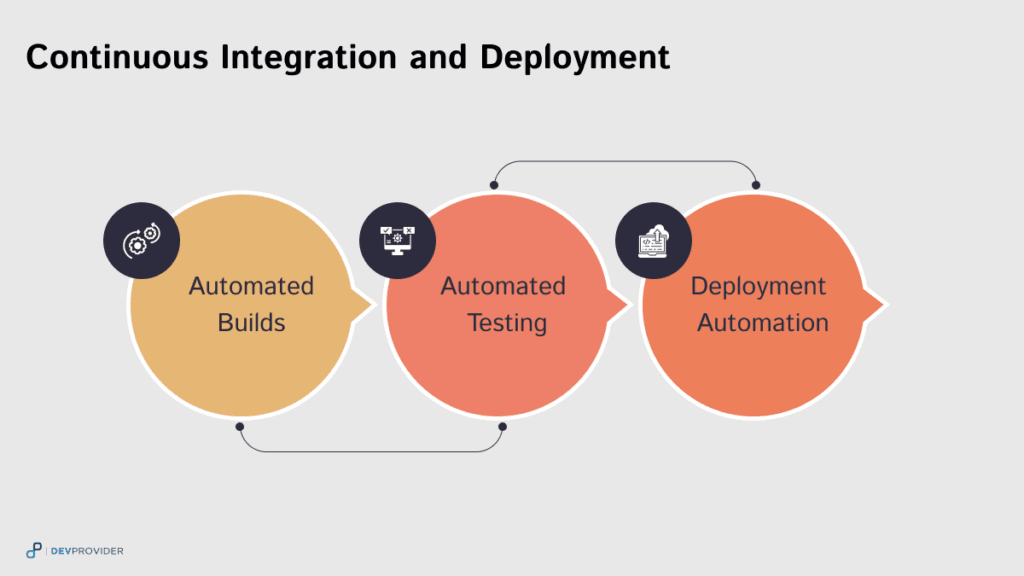
How we manage software development projects at DevProvider

Table of Contents
- Understanding Client Needs
- Strategic Planning and Resource Allocation
- Agile Methodology for Flexibility and Efficiency
- Tools for Effective Project Management
- Development and Rigorous Testing
- Continuous Integration and Deployment
- Client Collaboration and Feedback
- Quality Assurance
- Deployment and Final Delivery
- Post-Launch Support and Maintenance
- Case Studies and Success Stories
- Conclusion
In the ever-evolving world of software development, managing projects efficiently is crucial to delivering high-quality products on time and within budget. At DevProvider, our approach to software development project management is both innovative and client-focused. Leveraging advanced tools and methodologies, we ensure seamless execution from initial planning to final delivery. Here’s a detailed look at how we manage software development projects through our IT staff augmentation services.
Understanding Client Needs

The cornerstone of any successful project is a deep understanding of client needs. At DevProvider, we prioritize communication and collaboration to ensure we fully comprehend the requirements and expectations of our clients. Our process includes:
Initial Consultation: We engage in comprehensive discussions to understand the client’s business goals, target audience, and specific software requirements.
Requirement Gathering: Our team collaborates with the client to gather detailed requirements, which are meticulously documented and reviewed.
Feasibility Study: We conduct feasibility studies to assess the technical and operational viability, identifying potential challenges and opportunities.
Strategic Planning and Resource Allocation
With a clear understanding of client needs, we proceed to the planning phase. This stage is vital for establishing a solid foundation and involves several key activities:
Project Scope Definition: We define the project scope, outlining deliverables, timelines, and resources required, creating a detailed project plan.
Resource Allocation: We allocate skilled developers, designers, and project managers to ensure the project is adequately staffed.
Risk Management: We develop a risk management plan, identifying potential risks early and outlining strategies to mitigate them.
Agile Methodology for Flexibility and Efficiency
At DevProvider, we employ the Agile methodology, allowing us to be flexible and responsive to changes throughout the development process. Agile involves iterative development, breaking the project into manageable tasks called sprints. Our implementation includes:
Sprint Planning: At the start of each sprint, we define tasks and goals, ensuring alignment and clarity for the team.
Daily Stand-Ups: Short, focused daily stand-up meetings promote transparency and accountability, keeping the team informed about progress and obstacles.
Sprint Reviews and Retrospectives: We hold sprint review meetings to showcase completed work and gather client feedback, followed by retrospectives to evaluate and improve our processes.
Tools for Effective Project Management

To enhance our project management efficiency, we utilize modern tools like Trello and CMS for daily updates and client communication:
Trello for Task Management: Trello helps us manage tasks visually, track progress, and collaborate effectively. Each task is clearly outlined on Trello boards, providing real-time updates and visibility to both our team and clients.
CMS for Daily Reports: Our CMS system allows us to generate daily reports, ensuring clients are always informed about project status. These reports include progress updates, upcoming tasks, and any potential issues, fostering transparency and trust.
Development and Rigorous Testing
During the development phase, our team of skilled developers follows best practices and coding standards to ensure high-quality output. Key aspects of this phase include:
Collaborative Development: Our developers work collaboratively, leveraging each other’s expertise to solve complex problems and deliver robust solutions.
Code Reviews: Regular code reviews maintain code quality, ensuring a clean, efficient, and bug-free codebase.
Automated Testing: We implement automated testing, including unit testing, integration testing, and performance testing, to catch bugs early and ensure software functionality.
Continuous Integration and Deployment

To streamline the development process and minimize integration issues, we employ continuous integration and deployment (CI/CD) practices:
Automated Builds: Our CI/CD pipeline automates the build process, integrating the latest code changes smoothly and efficiently.
Automated Testing: Automated tests are run as part of the CI/CD pipeline to catch issues before they reach production.
Deployment Automation: We use deployment automation to ensure quick and reliable deployment of new features and updates, minimizing downtime.
Client Collaboration and Feedback
Client collaboration is central to our project management approach. We believe regular communication and feedback are essential for delivering a product that meets the client’s expectations. Our strategy includes:
Regular Updates: We provide regular updates on project progress, ensuring clients are informed every step of the way.
Feedback Loops: We actively seek client feedback at various stages, incorporating their input to refine and improve the product.
Transparent Communication: We maintain transparent communication, addressing any concerns or questions promptly.
Quality Assurance
Quality assurance (QA) is integral to our project management process. Our dedicated QA team ensures the software meets the highest quality standards before delivery. Our QA process includes:
Comprehensive Testing: Our QA team conducts functional, usability, security, and performance testing to ensure the software’s reliability.
Bug Tracking and Resolution: We use advanced bug tracking tools to identify, document, and resolve any issues during testing.
User Acceptance Testing: We conduct user acceptance testing (UAT) with the client to ensure the software meets their requirements.
Deployment and Final Delivery
Once the software has passed all quality checks, we move to the deployment phase:
Deployment Planning: We develop a detailed deployment plan, outlining the steps and resources needed for a successful launch.
Environment Setup: We set up production, staging, and testing environments to ensure a smooth transition.
Final Deployment: Our team handles the final deployment, ensuring the software is launched without issues and is fully operational.
Post-Launch Support and Maintenance
Our commitment to client satisfaction extends beyond the launch. We provide ongoing support and maintenance to ensure the software continues to function optimally:
Monitoring and Support: We continuously monitor the software, resolving any post-launch issues promptly.
Regular Updates: We provide regular updates and patches to enhance performance and security.
Client Training: We offer training sessions to help the client’s team effectively use and manage the software.
Case Studies and Success Stories
Here are a few examples of our successful projects, illustrating our project management approach:
Case Study 1: E-commerce Platform Development
Client: Leading e-commerce company
Challenge: Develop a scalable and secure e-commerce platform for high traffic.
Solution: Implemented a robust solution using Agile, with features like personalized recommendations and real-time inventory management.
Outcome: Increased sales and customer satisfaction.
Case Study 2: Mobile App Development for Healthcare
Client: Healthcare startup
Challenge: Create a mobile app to streamline patient management and improve doctor-patient communication.
Solution: Developed a user-friendly app with secure messaging, appointment scheduling, and telemedicine features.
Outcome: Positive user feedback and achievement of business goals
Conclusion
Effective project management is vital for the success of any software development project. At DevProvider, our comprehensive approach combines Agile methodology, CI/CD practices, client collaboration, rigorous QA, and the use of advanced tools like Trello and CMS. By adhering to these best practices, we ensure our clients receive high-quality software solutions that meet and exceed their expectations.
If you’re seeking a reliable partner to manage your software development projects, look no further than DevProvider. Contact us today to learn more about our IT staff augmentation services and how we can help you achieve your business goals.

